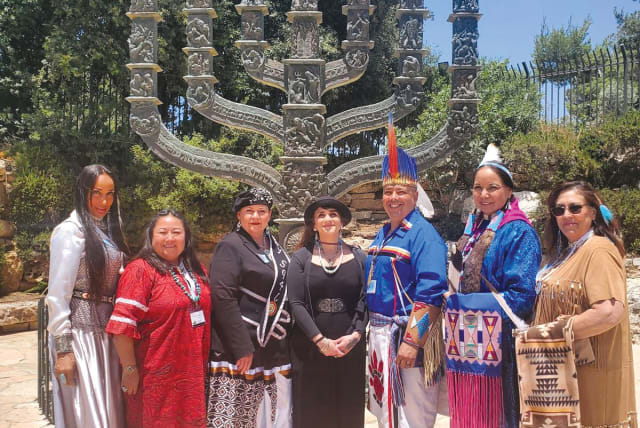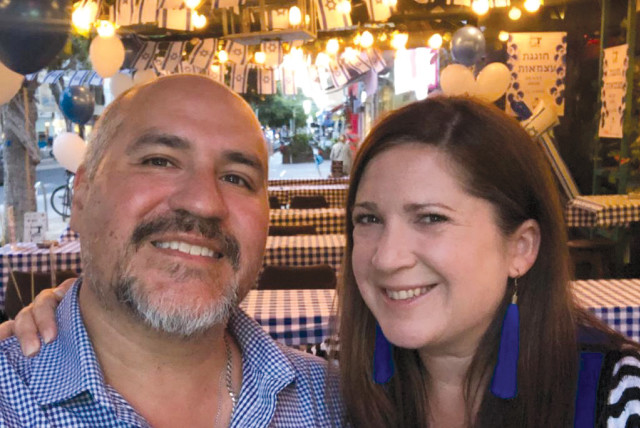The Native Americans who back Israel against Hamas

Meet Native American activists who support Israel in its ongoing war with Hamas.
Jason Watson, a Native American of the Chickasaw Nation in the United States and now an Israeli citizen, shares his WhatsApp conversation with a Native activist he has known for years. “She blocked me,” he says, illustrating how his words defending Israel’s response in Gaza are viewed by many in the community. The colleague, quick to defend the Palestinian cause after October 7, is a symptom of the turbulent and long-overlooked relations between Native American civil society and Israel.
Watson wasn’t always pro-Israel. Before his pioneer trip to Israel as a master’s student studying conflict resolution at the Minerva Center for Human Rights at the Hebrew University of Jerusalem in 2008, he sympathized with the Palestinians.
“When I was studying international law at Minerva and given a work placement here, I basically came to validate what I already knew or thought I knew – that Palestinians were being ethnically cleansed and unlawfully removed from their land. However, I left here with a more balanced view, definitely not knowing everything but having a more informed perspective of Israel. The idea of the Israeli-Palestinian conflict as portrayed in the United States was not a correct way to frame everything,” he says.
This became the tip of the iceberg for him, showing a conflict much deeper than specific protest issues such as security walls being built between the two communities. Watson did not forget his experience in Jerusalem and hoped to return. Soon after, he met the love of his life, a Jewish American named Jessica, and married her. They then moved to Israel.
An indigenous person's view of the Israeli-Palestinian conflict
His own frame of mind also started to change. What he saw in Israel was not an indigenous Palestinian population versus a colonialist Jewish one, but rather a fight between two communities of varying indigenousness that love the same land. The Jewish perspective, which he only discovered upon being in Israel and through his spouse, was profound.
“As an indigenous person, I look at what the Jewish people have done in Israel, and I see something that, even though the Chickasaws have had so much success, we will never have our homelands back the way the Jewish people do in Israel… We will never have our own state… We will never have our own military… our very own anything. We are a nation within a nation. And when I look at what the Jewish people have done with their self-determination, it is something for all indigenous people to look up to and to honor and to say, ‘Look, this is what it could be, this is where self-determination could take us.’”
Watson sees the Native American community’s relationship with Israel as one of enormous potential but currently tarnished by the powerful effects of social media. “For Natives that haven’t studied this area, it is easy to associate with the Palestinians. It is easier for them to say ‘The Palestinians are living my ancestors’ experience’… without considering that the Israeli Jews who live here are also indigenous.”
He believes the solution lies in outreach and understanding. “Natives should look deeper into what the Jewish experience is about and relate it to them. What is Zionism about? It is about self-determination. It is about returning to your homeland and making it your own. Has the execution of it been perfect? No, there is room to grow. But this is a democracy… this is not an apartheid state.”
Ateret Shmuel has major dreams for Native-Israeli relations. From her residence in central Jerusalem, she displays pictures of her adopted names from the Cherokee and Inuit nations, a sign of adopted kinship. She is director of the international nonprofit organization Indigenous Bridges, which since 2018 strives to build bridges between Native tribes worldwide and with the Jewish people. The organization’s goals include fostering social-cultural exchange, economic exchange, knowledge exchange, and solidarity visits worldwide among different tribes.
Shmuel grew up in the US in a multicultural environment where most of her friends and closest connections were other marginalized minorities.
She was active in human rights when the Mavi Marmara flotilla sailed to Gaza from Turkey in 2009, which she views as the turning point in her activism. “When I saw with my own eyes what happened and then also saw how the world media and my own activist community were dishonestly twisting the event to fit a deeply problematic antisemitic narrative, it made me realize the power of anti-Zionist disinformation. From that day on, I began to advocate for my own tribal nation, in addition to others.”
The problem with indigenous-Israeli relations is one of perception, Shmuel believes, spun from a bombardment by the media and foreign actors. The Jewish people and the Native tribes not only in the US but globally have a major common theme. Both have a very deeply rooted tradition – spiritual, physical, and historical ties to a piece of land. “Basically, for most indigenous communities, when you enter someone else’s land there’s this respect and understanding, not necessarily of ownership, which is a very colonialist concept. But land stewardship – like who stewards the land?”
The problem is also rooted in antisemitism, Shmuel believes. Pushing Jews into a “category” with many other causes together is the narrative of the new woke Left, suffering from what she calls “mutated intersectionality.” To be in the crowd fighting for minority rights, one must accept not only your particular cause but a salad of other causes as well. Shmuel explains, “This is the root of why groups like Black Lives Matter become pro-Palestinian…You can’t be X if you’re also not Y…You can’t be a feminist if you’re also not a vegan. You can’t be a socialist if you’re also not into animal rights. Why? They’re so different. Right. But this is what ‘intersectionality’ has become… To be accepted in the woke world, you have to keep ticking off boxes that are ever-changing…and one of the litmus tests is the Israeli-Palestinian conflict.”
Behind the movement is a colonialist soft-power financial trail. Many of the donors are from countries hostile to Israel such as Iran, Qatar, and Turkey, which view Israel as a renegade indigenous nation which humiliated the Muslim world by refusing to be defeated and absorbed into the rest of the Arabized Middle East. The countries earmark funds that influence groups and media organizations, to turn Arabs into another “oppressed group,” despite being the colonial majority group in the Middle East.
Shmuel cites Al Jazeera, the TV channel funded by Qatar, as an example. “Disenfranchised minorities want to seek out alternative sources of information. And so something like Al Jazeera English is very appealing because it acknowledges their real suffering. It acknowledges their real-lived experience of persecution and oppression and injustice.
“Americans who lack a global perspective, living in a massive country, end up becoming brainwashed. It’s very easy for them to believe that their experience can be projected onto the rest of reality, even if it’s completely inappropriate.”
As such, to the disenfranchised American, Arabs have become “the oppressed class,” despite oppressing minorities themselves and being the major colonialist superpower in the Middle East; and the Jews are “the whites,” despite being Middle Eastern. When October 7 happened, therefore, the situation exploded, and other minorities had a hard time relating to Jewish suffering.
In bridging the gap between Native tribes in the US and around the world, Shmuel has three answers to offer, especially in light of the October 7 attacks.
The first is inward and focuses on Jewish identity, which is tribal in nature, a point in common with the others. “A lot of our people don’t know who we are. There are many assimilated Jews who take on the narrative of Jews being white, European, colonial, when it is anything but true,” she says.
The second, built on the first point, is about connecting with other minority tribes in the Middle East, and even globally, many of whom also face persecution and past genocides – such as the Kurds, Yazidis, Assyrians, Druze, and Armenians. She reflects that in many protests in America, it was other Middle Eastern minorities that have come to the defense of Israel and the Jews, and this should not be ignored. “When there are tens of thousands of people marching saying ‘From the river to the sea…’ Jews are scared, they are terrified, they are a tiny minority; but combine Jews with other Middle Eastern indigenous people, and suddenly a small minority isn’t so small.”
Last is the creation of an indigenous people’s “embassy,” where leaders of tribes around the world can be welcomed by the Jewish “tribe” of Israel. Since October 7, Shmuel says, she has been receiving “endless messages from Native American chiefs, council members, VIPs, people in the American government who are Native, elders, medicine people, and respected members of the community who want to connect.”
The embassy is explained as a sort of gateway for building intercultural understanding. A place that, if Native chiefs visit, they will be welcomed in a traditional way that is respectful to both their culture and Israel. It is also there to avoid any faux pas, as there are many different customs and traditions among various tribes around the world. The idea is the brainchild originally of groups such as Indigenous Coalition for Israel and Fire Keepers International. It has gained traction with the support of Jerusalem’s deputy mayor Fleur Hassan-Nahoum.
Shmuel believes the future is hopeful. The embassy, she says, will “receive people from a place of honor and dignity the way that they need to be received, and my hopes are that it will create the groundwork for being able to form alliances that will shift everything,” she says. “If we are able to focus on our commonalities and remove oppression, it will not only change our region and our lives for the better, but it will have a ripple effect on the entire world.” ■
Jerusalem Post Store
`; document.getElementById("linkPremium").innerHTML = cont; var divWithLink = document.getElementById("premium-link"); if (divWithLink !== null && divWithLink !== 'undefined') { divWithLink.style.border = "solid 1px #cb0f3e"; divWithLink.style.textAlign = "center"; divWithLink.style.marginBottom = "15px"; divWithLink.style.marginTop = "15px"; divWithLink.style.width = "100%"; divWithLink.style.backgroundColor = "#122952"; divWithLink.style.color = "#ffffff"; divWithLink.style.lineHeight = "1.5"; } } (function (v, i) { });

